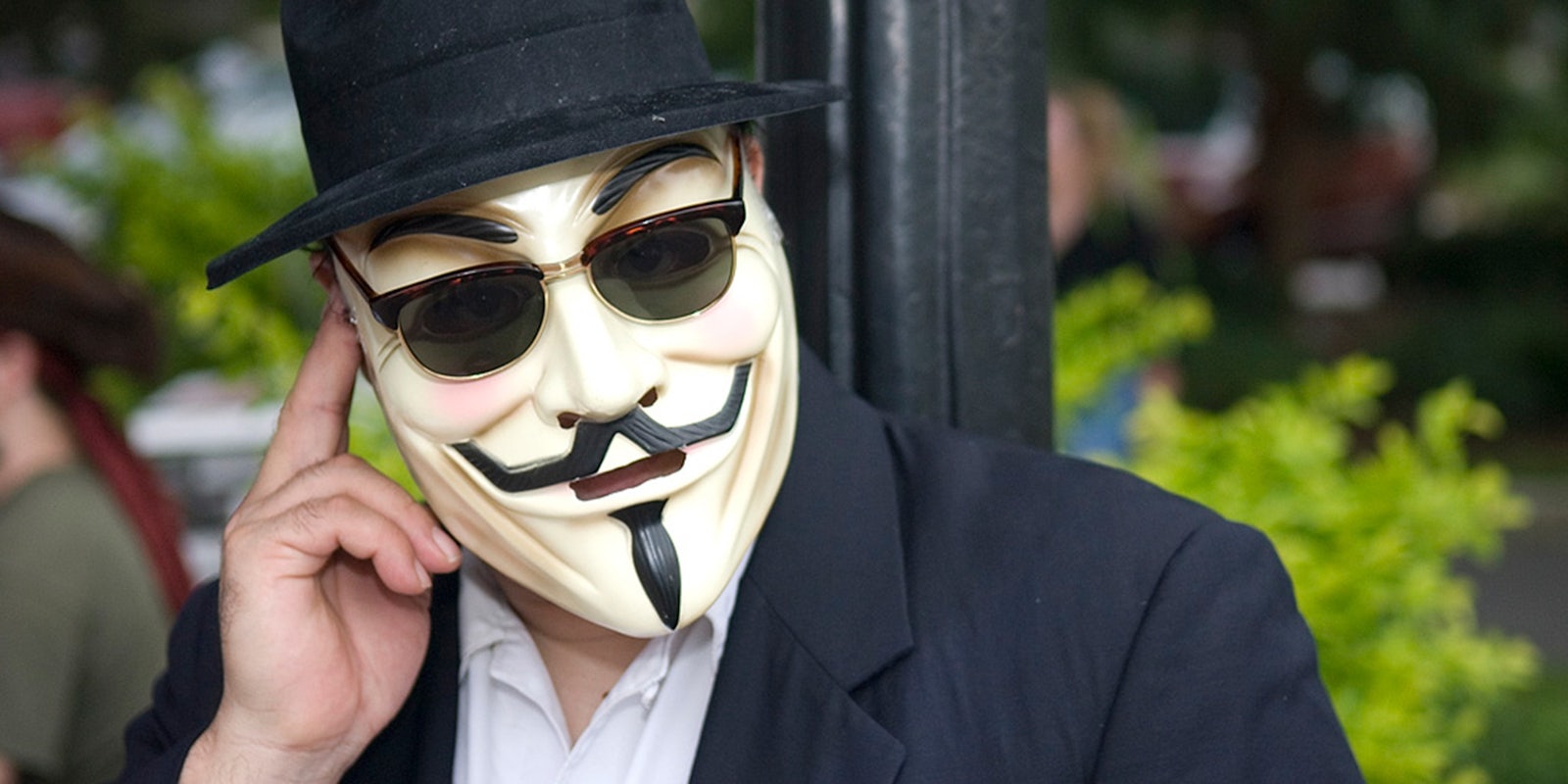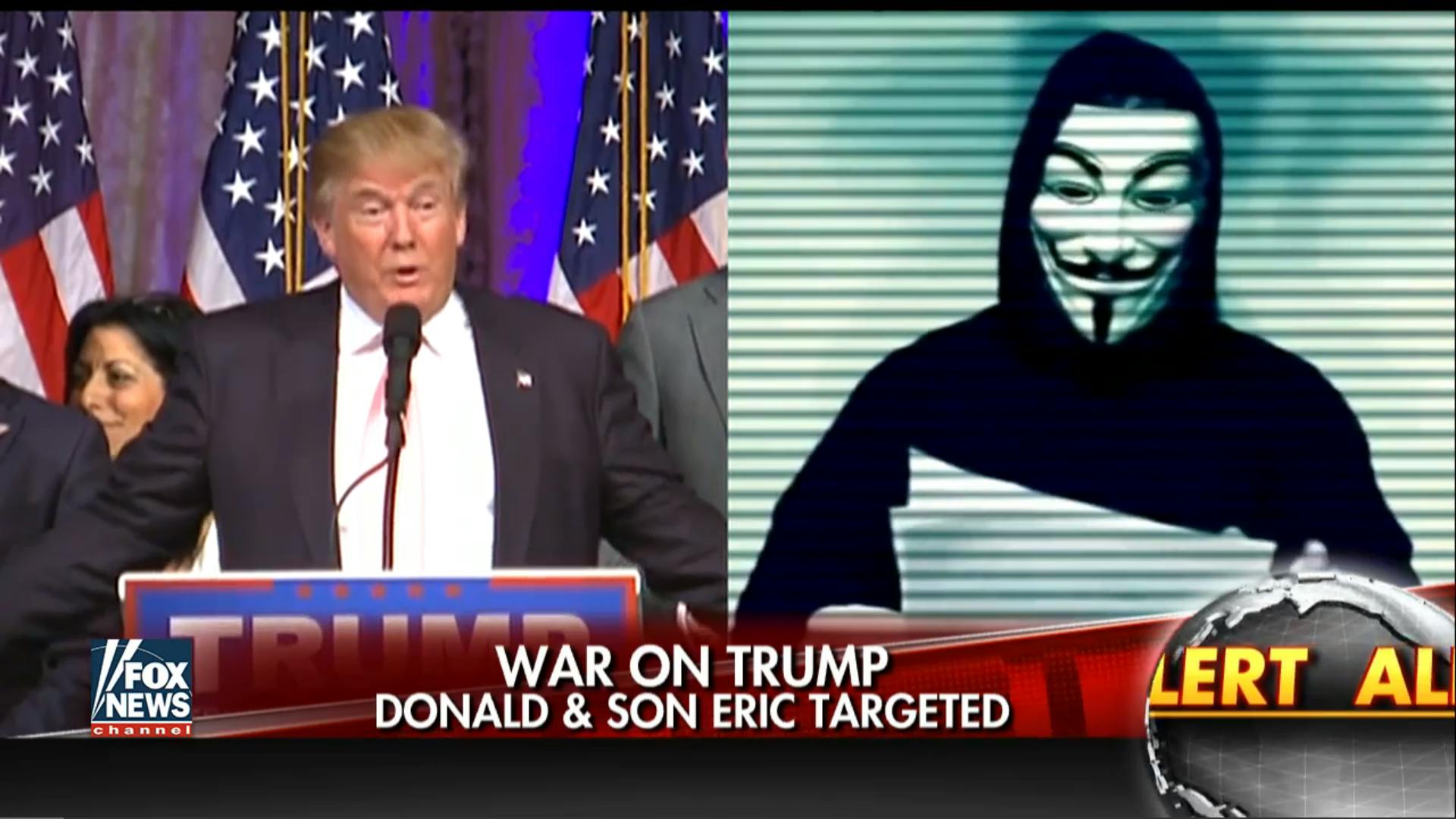Did you hear about the latest war being waged by Anonymous? You likely did—and you’re likely being duped.
In the last year alone, the group has loudly declared war on Donald Trump (again), the Islamic State, Sen. Ted Cruz (R-Texas), Michigan Gov. Rick Snyder, and the Ku Klux Klan, among other high-profile targets. This is made-for-TV stuff. Think CSI: Cyber meets Fox News and all the high ratings that entails.
The problem is that Anonymous—responsible for some of the most high-profile cyberattacks and online pranks of the last decade—is more a brand today than a group or even a “collective,” as it is so often described. By virtue of the group’s structureless anonymity, anyone can make headlines by releasing cut-and-paste videos warning of dire consequences for their enemies.
Unlike in years past, many of the “wars” declared by “Anonymous” these days are empty promises that accomplish little more than providing big, hot-air headlines that drive a reliable source of eyeballs for news channels and websites. In some cases, Anonymous hacktivists are blamed—some might say “given credit”—for attacks or leaks they did not commit.
It’s easy to see why.
The Anonymous brand grabs attention for a cause célèbre. The group captures the public’s imagination and desire for action against figures that evoke intense reactions—and media companies capitalize accordingly.
When the Daily Dot posts about Anonymous, for example, the articles do exceptionally well on Facebook and beyond. In the Daily Dot’s own politics section, internal analytics show Anonymous stories accounted for roughly 5 percent of all traffic over the past year, even as we’ve deliberately stayed skeptical of those who use the movement’s name for promotional purposes. (We’ve also been the target of an Anonymous campaign, Operation Destroy Daily Dot, or #OpDDD.)
There are a few regular sources of these declarations of war under the Anonymous umbrella. @TheAnonMessage, for instance, started #OpTrump. His résumé includes such illustrious empty threats as a war against Iggy Azelea and blaming the wrong police officer after the death of Michael Brown in Ferguson, Missouri.
“I literally do not know if he’s plain crazy or a deliberate disinformation artist out to make Anonymous look random and ineffectual,” said journalist Lorraine Murphy, a former Daily Dot contributor who regularly covers Anonymous activities. “PR companies would kill to have his reach.”
@TheAnonMessage did not respond to our request for comment.
Prominent individual members of Anonymous are actually the most vocal critics of these unverified operations—and the reporters who take self-proclaimed Anonymous hacktivists at their boisterous words.
Media: do not cover announcements, cover actions https://t.co/CXzWT4nG85
— Anonymous (@YourAnonNews) March 20, 2016
Wary of the growing problem, notable members warn that chronic empty words “causes a MAJOR discredit for the movement as a whole.”
Anyone can slap the name Anonymous on any Twitter account or YouTube channel and claim to have the group’s decade-old heritage behind it. But what’s really come of it?
The so-called “war on Trump” resulted in zero new leaks, but it got breathless coverage in many major American media outlets. Fox News anchors said “jaws were dropping” at the “hacking” despite no apparent hacking having taken place. (Trump’s personal data “leaked” by Anonymous-branded messengers has been online for years. Anonymous-branded outlets labeled the release a “joke” meant to “fool” Trump and law enforcement after the media caught wind that it was bogus.)
Likewise, the “war on Cruz” has produced nothing, even as his political opponents hope desperately that it does, and the “war on Snyder” (#OpFlint) yielded zero results. (Snyder himself released hundreds of his own emails without the help of hacktivists.)
The “war on the KKK” wasn’t so much an organized offensive as it was the publishing of some names, Facebook pages, and Google+ accounts, some of which had nothing to do with the KKK. Even so, uncritical reports showed up in places like BBC.
It wasn’t always this way.
There can be no doubt that at various times over the last decade, effective activists and hackers have used the Anonymous mantle to take real action. In years past, the group’s fight against Scientology resulted in high-profile protests, and an offensive against the Westboro Baptist Church directed over $25,000 to charity. Hactivists operating under Anonymous branding help Twitter flag pro-ISIS accounts for deletion (though even that is rife with controversy). And Anonymous offshoot AntiSec is said to have caused millions of dollars in damages to intelligence firm Stratfor in 2011, among other significant breaches.
Even operations that objectively backfired, like #OpDarkNet, began with tangible action. Now, many Anonymous operations effectively end with one press release and the media acting as stenographers for anyone who feels like donning the group’s name on social media.
Why? Anonymous is cool, which often sells a lot better than the truth.
Photo via Anonymous9000/Flickr (CC BY 2.0)



